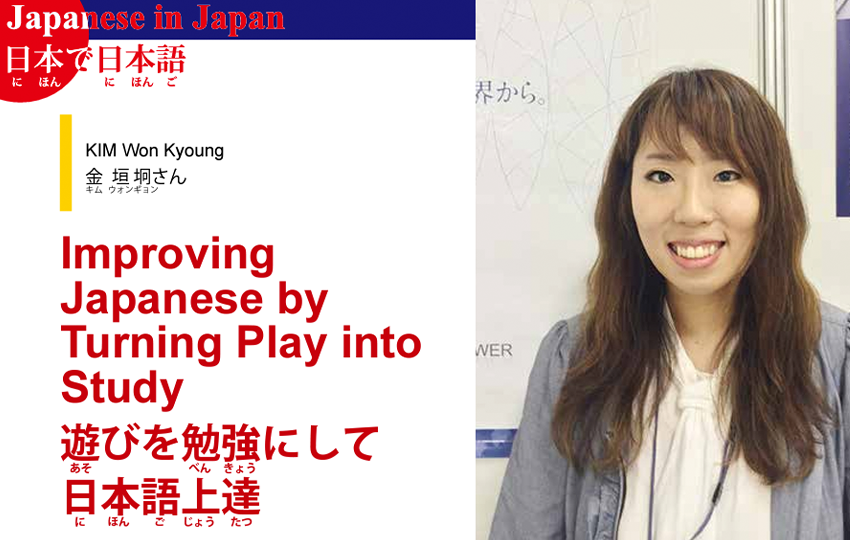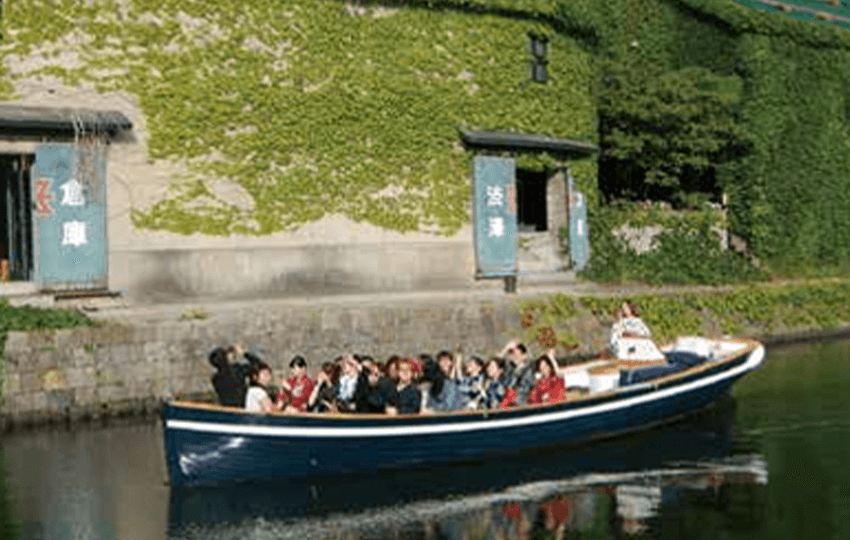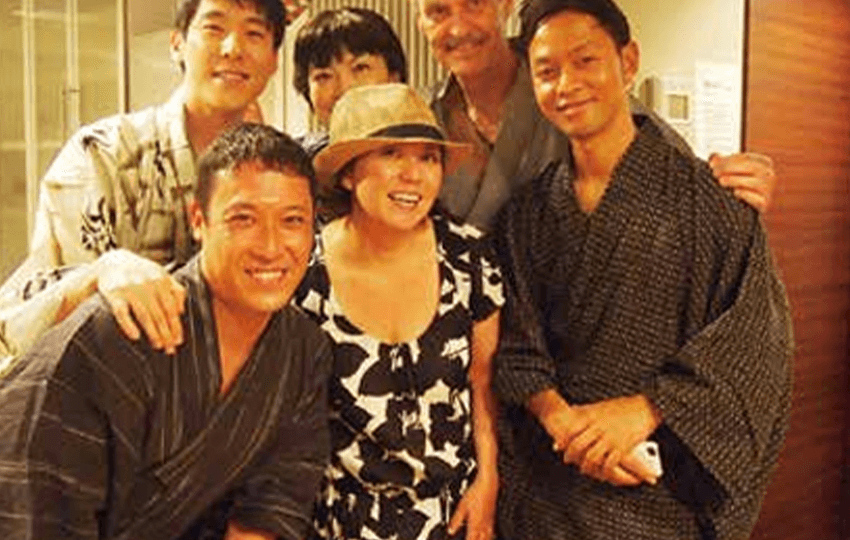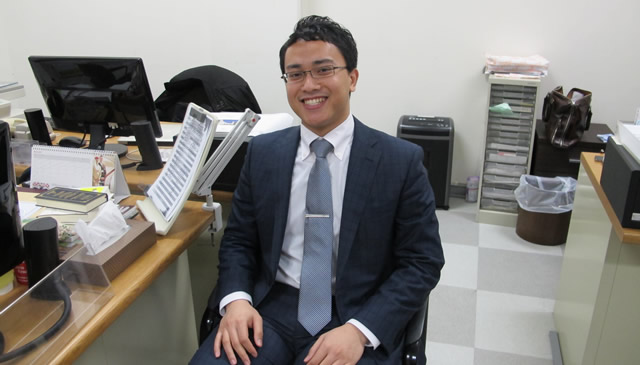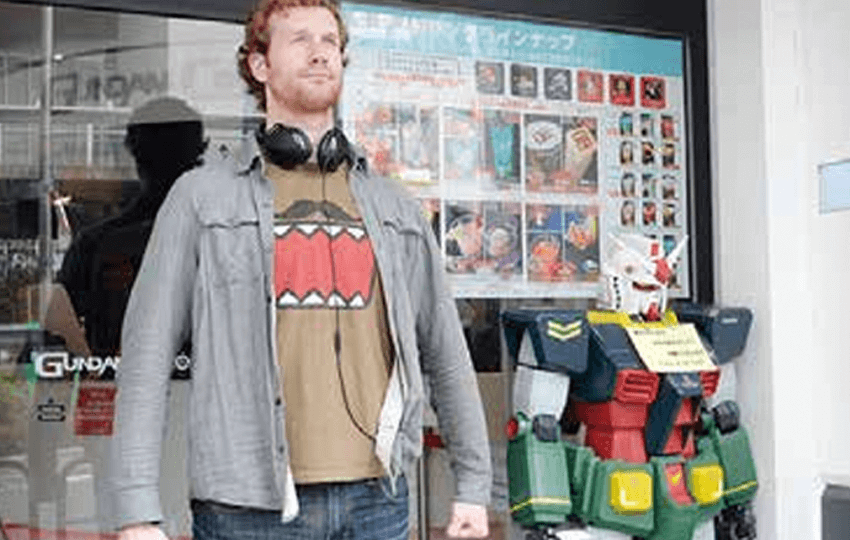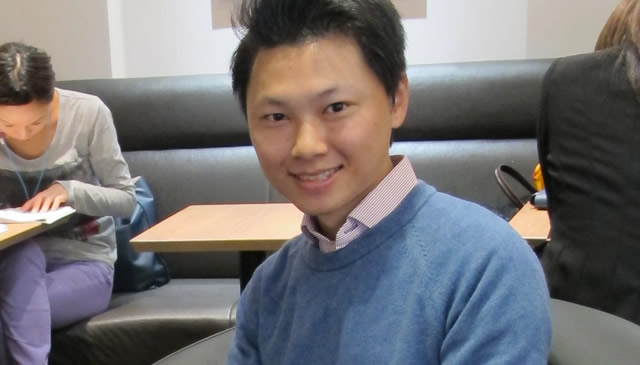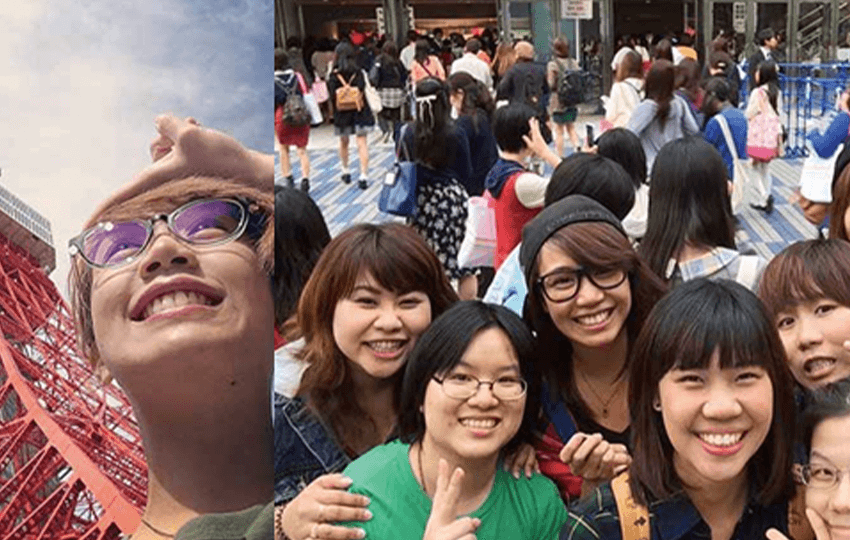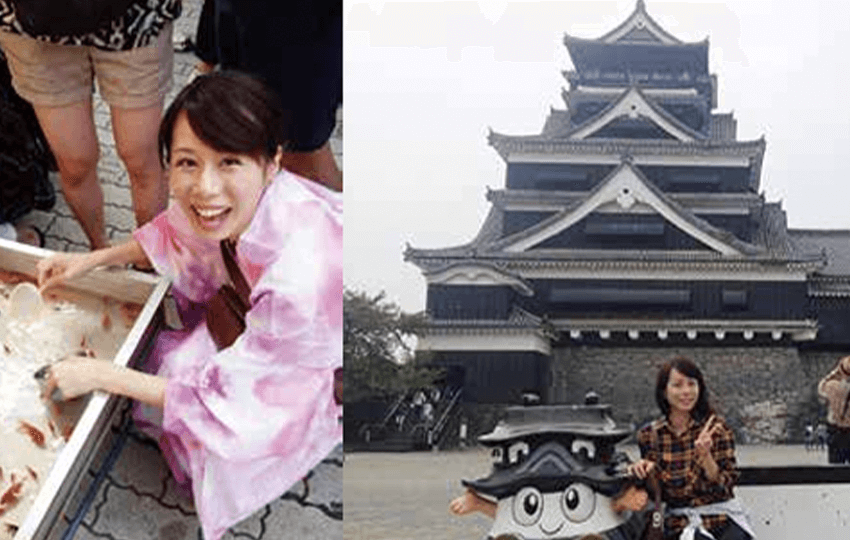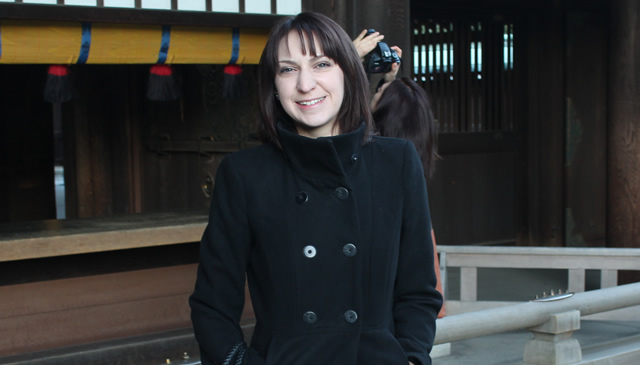-
[:ja][2015年8月号掲載記事]
金 垣坰さん
「中学時代、岩井俊二監督の映画『Love Letter』を見てすごく感動しました」と韓国人の金垣坰さんは日本に興味を持ったきっかけを話します。「映画の中で描かれている町の風景や言葉は韓国とは全然違うのに、登場人物が喜んだり悲しんだりするところが韓国人の一般的な情緒と全く同じでした。それまで、外国人はみんな自分達とは違うはずと思っていた私にとっては新鮮な驚きでした」。
金さんは2012年4月に日本に来ました。赤門会日本語学校のビジネス就職クラスで日本語力をブラッシュアップしながら就職活動をしました。現在、株式会社ヒューマンパワーという外国人に特化した人材紹介会社で働いています。「日本での2つ目の職場です。以前の自分のように、日本で働きたい、日本で自分の夢を実現させたいと思っていらっしゃる外国人の方々が目標に近づけるよう努めています」。
金さんが日本語の勉強を始めたのは大学でした。「日本語を専攻すれば、少なくとも私の大好きな日本の歌やドラマを、歌詞カードや字幕なしでもわかるようになるかな、という軽い気持ちでした」。
しかし、歌やドラマを通じて日本語に親しんできた金さんには、授業はすぐにつまらないものになってしまいました。そこで考えたのは、遊びを勉強にすればいいということでした。金さんは好きなアイドルが載っている雑誌を買い、辞書を引きながら読みました。また、日本人の友達をつくり、メールでのやり取りも始めました。
「最初は、雑誌1ページを訳すのに1時間以上かかりましたが、だんだん文章の構造がわかるようになりました。日本の文化や風習を学ぶこともできました。茶柱が立つといいことがあると知ったのもそのおかげです」と笑います。1年後、金さんの日本語は日本の友達が驚くほど上達しました。
日本語の勉強で大変だと思うことは敬語だと金さんは話します。「最近『~させていただく』という言葉を、相手にやってもらうときも使ってしまい、冷や汗をかきました。でも、日本語の勉強で楽しいと思うところも敬語です。使いこなすのは難しいですが、正しくきれいな言葉遣いをしようと常に意識することで、私自身の言動も丁寧になると思います。そしてそれが相手に良い印象を与えることができます」。
休日はその日の気分で知らない街を歩くのが好き、と金さん。「都内の路線図を開き、行ったことのない駅を一つ決めます。そして、あてもなくその街をぶらぶら歩きながら、冒険を楽しみます。そうやって気持ちを切り替えると、たまっていたストレスも軽くなり、また明日もこの国でがんばろうと元気になれます」。
株式会社ヒューマンパワー[:en][From August Issue 2015]KIM Won Kyoung
“Back in middle school, I was really inspired by the movie ‘Love Letter’ directed by IWAI Shunji,” says KIM Won Kyoung from South Korea, explaining how she first became interested in Japan. “Even though the scenery of the towns and the language were completely different to South Korea, the characters experienced exactly the same kind of highs and lows as Koreans do. That was an eye-opener for me as I had assumed up until then that all foreigners were different from us.
Kim came to Japan in April 2012. She searched for a job while trying to brush up her Japanese skills in the Business Shushoku (Job Hunting) Class at the Akamonkai Japanese Language School. She currently works for Human Power Co., Ltd., an employment agency that specializes in non-Japanese talent. “It’s my second job in Japan. Just like me when I first came to Japan, there are many foreigners wanting to work in Japan and realize their dreams here, so I’m doing my best to help them achieve their goals.”
Kim started learning Japanese in college. “Without taking it too seriously, I thought that if I majored in Japanese, at least I would be able to understand my favorite Japanese music and television shows without needing the translated lyrics or subtitles.”
However, even though Kim was familiar with Japanese through songs and TV dramas, she soon found classes boring. That’s when the idea occurred to her to turn play into study. She went out and bought a magazine featuring one of her favorite singers and read it while thumbing through a dictionary. Furthermore, she made Japanese friends and even corresponded with them via e-mail.
“In the beginning it would take me over an hour to translate one page of a magazine, but gradually I began to understand the sentence structures. I was also able to learn about Japanese culture and customs. I learned about things such as ‘when tea stalks float, it’s an auspicious sign,’” she laughs. Kim’s Japanese friends were surprised at how quickly her Japanese improved in just one year.
Kim says that learning polite Japanese is definitely a struggle for her. “Recently I used the phrase ‘sasete itadaku’ hoping to get a favor out of somebody and I broke out in a cold sweat. But courteous language is also an interesting part of learning Japanese. Mastering it is difficult, but when I’m trying to use the language correctly, I become self-aware and find that my actions as well as my words become more polite. That’s a great way to make a good impression on people.”
On her days off she likes to walk around an unfamiliar area that she picks depending on her mood that day. Kim says. “I’ll open up a train map of the city and decide on a station I haven’t been to before. Then, without any particular goal in mind, I’ll just wander around the district and enjoy my own little adventure. By doing this my mood changes and the stress that’s built up inside me is alleviated, my batteries are recharged so that I can give my all to another day in this country.”
Humanpower Co., Ltd.[:] -
Cruise Guide Recounts the History of Otaru
- Hiragana Times
- Jun 03, 2016
[:ja][2015年7月号掲載記事]
ブラッド・マッカイバーさん
北海道小樽市にある小樽運河は、古い倉庫群が見どころの日本でも人気の観光地です。その町並みを水面から楽しめるクルーズ船のキャプテンとして働くのがニュージーランド人のブラッド・マッカイバーさんです。景色や建物の歴史を日本語で案内しているのが外国人と知り、多くの観光客が驚きます。
ブラッドさんが日本語に出会ったのは高校生のときでした。「マオリ語はニュージーランドでしか使えないし、フランス語は先生がきらいだったんです」という理由で、消去法で残った日本語を選択することにしました。「英語と全然違うところがいいと思いました。成績も結構よかったんですよ」。
高校を卒業した後、千葉県の高校に11カ月間留学しました。「高校で4年間日本語と日本の文化を勉強したのですが、最初は話しているスピードについていけず、全く聞き取れませんでした」。ホストファミリーがゆっくり話してくれたことで少しずつ日本語に慣れていったと話します。家族はスキーが好きで、ブラッドさんも何度か連れて行ってもらいました。このことが後の日本滞在に大きな影響を与えます。
留学後ニュージーランドの大学で地質学と日本語を専攻し、卒業後はJETプログラムに合格。埼玉県越谷市役所で働くことになります。国際交流に関する仕事を担当しましたが、同時に市役所のスキー部にも所属し、仲間とスキーを楽しむようになります。3年務め一旦帰国しますが、日本でスキーをしたい、と北海道のキロロリゾートでの仕事を見つけました。
キロロリゾートはスキー場で知られており、夏よりも冬が忙しいリゾート地です。勤め始めて数年した頃、お客の減る夏の間だけ、隣の小樽市で運河クルーズのガイドスタッフとして働いてみないか、と声をかけられます。
しかし、ガイドの内容はアウトドアではなく主に歴史に関することです。「最初は覚えるのが大変でした。最初の2カ月ほどはできるところまでガイドをし、残りは先輩キャプテンに交代、ということを繰り返し、少しずつ一人で案内できる距離をのばしていきました。4年目になる現在では、天候や雪景色などに合わせて紹介する内容を変えられるほどです。
ガイドとしてベテランになってきたブラッドさんですが、日本語のイントネーションが英語寄りになってしまうのをなおしたいと思っています。しかしその一方で「日本語が完璧になったら英語のイントネーションが変になりそうで。最近英語を話していないので、たまに話すと違和感があるんです」と笑います。
小樽運河クルーズ
文:市村雅代[:en][From July Issue 2015]Brad McIVOR
With its delightful old warehouse district, the Otaru canal in Otaru City, Hokkaido is a popular sightseeing destination even for Japanese. Here, New Zealander Brad McIVOR works as the captain of a cruise ship that allows visitors to enjoy the cityscape from the water. Many tourists are surprised when they discover that this non-Japanese person introduces the history of the landscape and the buildings in Japanese.
Brad was a high school student when he first encountered the Japanese language. “Maori was used only in New Zealand, and I disliked the French teacher.” So he chose Japanese by a process of elimination. “I thought that it was a good thing that it was a completely different language from English. I got quite good grades, too.”
After graduating from high school, he studied abroad at a high school in Chiba Prefecture for 11 months. “Although I studied Japanese and the Japanese culture for four years in high school, at first I could not follow what people were saying because of the speed of their speech.” He says that because his host family spoke slowly to him, he gradually became accustomed to Japanese. Because this family liked skiing, they took Brad along with them several times. This later had a huge influence on his decision to stay on in Japan.
After studying abroad, he majored in geology and Japanese at a university in New Zealand, and after graduating, was selected for the JET Programme. He landed a job at the City Hall in Koshigaya City, Saitama Prefecture where he was put in charge of work relating to international exchange, but at the same time enrolled in the city hall skiing club and came to enjoy skiing with friends. After working there for three years, he returned to his home country, but wanting to ski in Japan again, found work at Kiroro Resort in Hokkaido.
Kiroro Resort is known for its ski slopes and the resort is busier in winter than summer. After several years had passed since he began work there, he was asked if he was interested in working during the summer low season as a guide for a canal cruise company in neighboring Otaru City.
However, the work of a guide dealt mainly with history and not with the outdoors. “At first it was difficult to memorize information.” For about the first two months, he would conduct the tour as far as he could and then let the more experienced captains take over, but by repetition he gradually extended the time he could recount the script. Now in his fourth year, he’s got to a point where he can go off script and can introduce different information depending on the weather and amount of snow.
Although he’s a seasoned guide, Brad has a tendency to use English intonation when speaking Japanese and this is something he wants to remedy. However, on the other hand, “My English pronunciation may become strange if my Japanese becomes perfect. Since I have not spoken English recently, it sometimes feels strange when I speak it,” he laughs.
Otaru Canal Cruise
Text: ICHIMURA Masayo[:] -
[From June Issue 2015]
Ari TAMAT
“I like Japanese architecture. Buildings in Europe are regulated because of the history of its cities, but in Japan, unique buildings keep popping up. In addition to this freedom of design, there is abundant funding available to implement advanced architectural technology. All this drew me to Japan,” says Ari TAMAT, from Indonesia. He speaks Japanese fluently and his pronunciation is perfect.
Because of his father’s work as a scientist, Ari grew up in both Indonesia and Australia. “As a child, I spoke English better than Indonesian,” he says. “My father had traveled to Japan several times for work, and told me that Japan was the most technologically advanced nation in Asia and that the people were nice. That’s partly why I chose to study abroad in Japan.”
A scholarship from the Japanese government enabled Ari to study in Japan. “I had already enrolled at the prestigious Institut Teknologi Bandung, but because I was going to study abroad, I dropped out after the first six months. I learned hiragana, katakana and basic conversational Japanese in Jakarta before I came to Japan in the spring of 1994.”
He attended a Japanese school affiliated with Tokyo University of Foreign Studies, and during the course of one year acquired a proficiency in Japanese sufficient to graduate from high school. “Japanese grammar and pronunciation were not as difficult as I had imagined, but kanji were difficult to learn,” he says. “At the Japanese school we studied about 13 kanji every day. I practiced them repeatedly by writing and reading them out loud. I also tried to memorize them as pictures, to understand the concepts behind them and to compare their current meanings in Japanese with their original meanings in Chinese.”
I think the reason my Japanese improved quickly is that the teachers and the program at the Japanese school were great. I was able to remember my lessons because the teachers made the classes fun by telling a lot of jokes,” says Ari. “Moreover, my classmates were exchange students from all over the world. We lived in the same dorm and used Japanese to communicate, which helped a lot, too.” In addition, Ari made Japanese friends outside his Japanese school; he joined an exchange group and in order to create more opportunities to use Japanese, participated in activities with Japanese people.
Ari studied architecture at Yokohama National University. “The biggest difficulty I had was not being able to read my professors’ messy handwriting,” Ari laughs. “College life was very enjoyable. Together with my classmates, I designed and actually built a beach hut and constructed a booth for a school festival.” He went on to graduate school at Tokyo University and majored in city planning.
Ari got a job in the real estate industry. “I didn’t have trouble using Japanese, but I struggled with business etiquette because I didn’t study it in college,” he laughs. “By observing my superiors and bosses, I learned how to exchange business cards, where to stand in an elevator, and where to sit in a room. In order to learn honorifics, I would recommend using them as often as possible so they come to you naturally,” he says.
Now he works in finance. “I’m interested in work assisting Japanese companies to expand into Indonesia’s booming economy,” says Ari. “But I like Tokyo a lot, so I would prefer to keep on living here. What’s great about Tokyo is that it’s one of the largest cities in the world, and brings together unique places such Shinjuku and Asakusa,” he says with a mischievous smile.
Text: SAZAKI Ryo[2015年6月号掲載記事]
アリ・タマットさん
「日本の建築が好きです。ヨーロッパは街に歴史があるのでその規制を受けていますが、日本では奇抜なビルがどんどん建ちます。デザインが自由にできる上、それを実現できる建築技術と資金があるからです。それにひかれて日本に来ました」とインドネシア出身のアリ・タマットさんは言います。その日本語は流ちょうで発音も正確です。
アリさんは科学者である父親の仕事の都合で、インドネシアとオーストラリアを行き来して育ちました。「インドネシア語より英語の方が得意な子どもでした」と言います。「父は仕事で何回か日本へ行き、日本はアジア一の技術大国で民族性もいいと話してくれました。それもあって留学先に日本を選びました」と言います。
アリさんの留学は日本政府の奨学金で実現しました。「名門のバンドン工科大学に入学していたのですが、留学が決まったので半年で退学しました。ジャカルタでひらがなとカタカナ、日常会話を学んでから1994年の春に来日しました」。
日本では東京外語大学附属の日本語学校に通い、1年間で高校卒業レベルの日本語を身につけました。「日本語の文法と話し言葉は意外と簡単です。でも漢字は難しいですね」と言います。「日本語学校では、毎日13個くらいの漢字を習いました。何度も何度も書いて読んで練習しましたよ。漢字を絵として覚えようとしたり、概念を理解しようとしたり、今の日本での意味を元の意味や中国での意味と比べたりして頭に入れました」。
「日本語の上達が早かったのは、その日本語学校の先生とカリキュラムが良かったからだと思います。先生が冗談をたくさん言う楽しい授業だったのでよく覚えられました」とアリさん。「それにクラスメートは世界各地から来た留学生仲間でした。同じ寮で暮らしていて、共通語が日本語だったのもよかったですね」。また、日本語学校の外でもアリさんは日本人の友達をつくり、交流サークルで一緒に活動することで日本語を使う機会を増やしました。
アリさんは横浜国立大学で建築を学びました。「苦労したのは、先生の書く字が汚くて読めなかったことです」と笑います。「大学生活はとても楽しかったです。学生たちでデザインして実際に「海の家」(海水浴客のための仮設の休憩所)を建てたり、学園祭ではブースを手作りしたりしましたよ」。その後は東京大学の大学院に進んで都市計画を専攻しました。
アリさんは不動産業界に就職しました。「日本語能力で苦労はしませんでしたが、ビジネスマナーで苦労しました。大学では習いませんから」と笑います。「名刺交換の仕方やエレベーターの乗る位置、部屋の中で座るべき場所など、先輩や上司を見ながら学びました。敬語は、使うと覚えるので話す機会をつくるといいですよ」とアドバイスします。
現在は金融の仕事をしています。「インドネシアの景気がいいので、ゆくゆくは日本企業の進出を助ける仕事をしてもいいかなと思っています」とアリさん。「でも好きな東京に今後も住み続けたいです。新宿や浅草など個性的な街が集まって世界屈指の巨大都市を成しているのが魅力ですね」と茶目っ気たっぷりにほほえみました。
文:砂崎良
-
[From May Issue 2015]

Furat BANTAN
“It’s gotten so that when I’m with non-Japanese friends in a restaurant, waiters only address me. Of course, I can speak Japanese and added to that, since I am of Indonesian descent, I appear to be Japanese, however I am a Saudi Arabian born and raised in Mecca,” says Furat BANTAN in a droll manner with perfect pronunciation. “I am Bantan, just like junbi bantan (completely ready,)” he jokes.
Japanese anime and games are extremely popular with young people in Saudi Arabia. Bantan also became interested in Japan because of this. “I watched Japanese anime and played Japanese games that were not translated into Arabic with the help of English subtitles. Thanks to this, I became accustomed to the Japanese language and, since I often checked words in the English dictionary, I memorized English words as well,” he laughs.
After graduating from high school Bantan won a scholarship from the Saudi Arabian government to study aboard and elected to go to Japan. “In Saudi Arabia, Japanese cars, air-conditioners, TVs and so forth are highly prized. I also wanted to learn about such advanced technology,” he says.
When Bantan came to Japan he attended a Japanese language school in Osaka. “Teachers admired me and said ‘Bantan, your Japanese is very good,’ but my listening, pronunciation, and keigo (formal language) skills were all down to watching anime,” he says modestly. One year later, he entered the Tokyo Institute of Technology – one of Japan’s most prestigious universities.
What awaited him at university were classes in which scientific and technical terms were frequently used. “I didn’t even understand which textbook I had to open. I asked the Japanese student sitting next to me ‘which one is it?’ and received an astonished look,” says Bantan. Moreover, the classes and textbooks were aimed at students who’d studied the curriculum of Japanese high schools. “Classes progressed as if I would naturally know things I had not learned at high school in Saudi Arabia.”
Bantan could not keep up with the classes at all and he had to repeat his first year. “It was so difficult that I wanted to die. There was an exchange student from my own country in my dormitory, so we survived by cheering each other up. After all, kanji is difficult. Arabic letters are phonetic symbols, so I had a very hard time with kanji which have numerous pronunciations,” he says.
Bantan bought textbooks written in English and studied by comparing the Japanese textbooks to them. “I taught myself from the most basic level with titles like ‘anyone can understand’ and ‘for Dummies’ (for people who do not know the subject). Because English was not my mother tongue, it was difficult to understand the contents. But I came to understand the technical terminology as I checked the equivalent term in English.” After about a year and a half of entering university he came to understand what was being taught in class. He passed the N1 grade of the Japanese proficiency test when he was in his senior year.
He also experienced the Japanese system of job hunting. “Because Japanese companies demand that I act the same way as Japanese natives, I wore a suit and carried a bag just like them,” he says humorously. When (the then) Crown Prince Salman visited Japan from Saudi Arabia, Bantan acted as an interpreter. Currently, he works at a Saudi Arabian government office located in Tokyo. “I want to encourage interaction between Saudi Arabia and Japan. In addition, it’s my dream to someday start a business. I want to dedicate my entire life to creating the Bantan Group that will establish and run schools teaching Arabic, regular schools, mosques, and more.”
Text: SAZAKI Ryo[2015年5月号掲載記事]フラート・バンタンさん
「外国人の友人たちとレストランにいると、店員が僕にだけ話しかけてくるようになります。確かに僕は日本語が話せますし、インドネシアの血を引いているので日本人にも見えるようですが、メッカで生まれ育ったサウジアラビア人ですよ」と、フラート・バンタンさんは完璧な発音で、ひょうきんに話します。「準備万端のバンタンです」とジョークも飛ばします。
サウジアラビアでは日本のアニメやゲームが青少年に大人気です。バンタンさんもそれで日本に興味を持つようになりました。「アラビア語には訳されていない日本のアニメやゲームを、英語字幕を頼りに見たりプレーしたりしていました。おかげで日本語に慣れましたし、英語辞書をよく引いたので英単語も覚えました」と笑います。
バンタンさんは高校卒業後、サウジアラビア政府の奨学金で留学できることになり、日本を選びました。「サウジアラビアでは、日本の車やエアコン、テレビ等がとても評価されています。そういう高い技術を学びたいという気持ちもありました」と言います。
来日したバンタンさんは大阪で日本語学校に通いました。「先生たちは、バンタン君はとても日本語が上手ですねと感心していましたが、聞き取りや発音、敬語ができたのはアニメで慣れていたからです」と謙遜します。1年後、難関大学の一つ、東京工業大学に入学しました。
大学で待ち受けていたのは、理系の専門用語がひんぱんに出てくる授業でした。「開くべき教科書もわからず、となりの日本人に『どの本ですか』と聞いて、あきれられました」とバンタンさん。それに授業や教科書は、日本の高校のカリキュラムで学んできた学生向けにできていました。「サウジアラビアの高校では教わらなかったことも、当然知っているものとして授業が進んでいきました」。
バンタンさんは授業にまったくついていけず、1年目は留年してしまいました。「死にたいと思うくらいつらかったですね。寮に同国の留学生がいたので、なぐさめ合って乗り切りました。やはり漢字は難しいです。アラビア語の文字は表音文字なので、読み方が何通りもある漢字にはとても苦労しました」と言います。
バンタンさんは英語で書かれた教科書を買って、日本語のものと読み比べながら勉強しました。「タイトルに『だれでもわかる』とか『for Dummies』(わからない人のための)とか書いてある、いちばん低いレベルから独学しました。英語も母語ではありませんから、内容を理解するのが大変でした。でも専門用語は英語と突き合わせているうちにわかるようになりました」。入学して1年半ほど経った頃から授業がわかるようになりました。4年生のときにはN1に合格しました。
日本の就職活動も経験しました。「日本の企業は日本人と同じ行動をすることを求めるので、リクルートスーツを着てカバンを持って、ですね」とおどけて言います。サウジアラビアからサルマン皇太子(当時)が来日したときには通訳を務めました。今は東京にあるサウジアラビアの政府機関で働いています。「サウジアラビアと日本の架け橋になりたい。そしていつかは起業するのが夢です。アラビア語を教える学校や、普通の学校、モスクなどを設立・運営するバンタン・グループを一生かけてつくりたいです」。
文:砂崎良 -
[From April Issue 2015]
Nate SHURILLA
“The other day when I went to a business networking event for various companies and made a presentation in Japanese, so many people rushed up to me to exchange business cards that I ran out,” says Nate SHURILLA in fluent Japanese. “Also, when I was job hunting, a broader range of options opened up to me because I could speak Japanese; this resulted in a job offer from one of Japan’s main mega banks. The ability to speak the native language gives you a huge advantage when it comes to securing a job in a foreign country.”
Shurilla hails from the state of Wisconsin in America. “Before he got married, my father lived in Japan doing volunteer work for his church, and used to discuss his memories of this experience with me and taught me simple Japanese. Through this, I became interested in Japan, too, and elected to learn the Japanese language in my middle and high school years.” When it came time for him to enter secondary education, Shurilla applied to do volunteer work for his church and went to Japan, just like his father.
At first, Shurilla was shocked because it was so difficult for him to understand spoken Japanese. “My first placement was in Yamagata Prefecture where I couldn’t understand a word the old people spoke. Later I understood that they had a unique dialect. However, the experience had a huge impact on me at the time and it made me think I had to study more Japanese. At the same time, though, I understood that the conversation would continue even when I did not understand the words, if I just smiled and said, ‘I see, I see,’” he jokes.
Shurilla decided to study ten new words, two new grammar rules, and five new kanji every day. “I used store-bought flashcards and also read books. The first book I read had about 200 pages. It began to make sense at around page 150,” he says.
When his two years of volunteer work came to a close Shurilla returned home and went to college. There he chose to take classes in Japanese where he studied grammar and the cultural background of Japanese expressions. “Thanks to the grammar lessons, I could systemize knowledge I acquired during my stay in Japan. Also, understanding Japanese culture is very important. For instance, I think the greeting ‘otsukaresama desu’ (thank you for your work) is uniquely Japanese. Bearing in mind that it comes from appreciating other people’s hard work and being considerate of their fatigue, you would know in which situations to use the expression.”
When he was a college senior, Shurilla sat for the Japanese Language Proficiency Test (JLPT) N1 and passed. He then applied for the Japan Exchange and Teaching (JET) Programme and returned to Japan. “I returned to Japan because the earnestness and diligence of the Japanese people had made a big impact on me during my previous stay and I had begun to love Japan,” he says. “While working in Japan, there was a period when I was bothered by the interference of my direct supervisor, but I overcame that by talking to another boss at a higher level.”
Now, Shurilla is working for a marketing company in Tokyo. “If you speak your native language and Japanese and have some kind of skill, like programming, you can find many job opportunities in Tokyo,” he says. “I am now involved in ‘Around Akiba,’ a project to promote the appeal of Akihabara to the world. I feel it’s an advantage to be able to speak Japanese, particularly when doing interviews.”Text: SAZAKI Ryo[2015年4月号掲載記事]
ネイト・シュリラさん
「先日、異業種交流会へ行って日本語でプレゼンをしたところ、名刺交換を希望する人が殺到して名刺がなくなってしまいました」とネイト・シュリラさんは流ちょうな日本語で言います。「就職活動をしたときも、日本語ができることで可能性が広がり、日本を代表するメガバンクからも声がかかりました。外国で就職するには、その国の言葉を話せることが大きな強みになります」。
シュリラさんはウィスコンシン州出身のアメリカ人です。「父は結婚前に、教会のボランティア活動で日本に住んだことがあり、思い出話をしたり簡単な日本語を教えてくれたりしました。それで私も日本に興味を持つようになって、中学・高校で日本語を選択しました」。大学に進学したシュリラさんは、お父さんと同じように教会のボランティアに志願して来日しました。
当初、シュリラさんはあまりにも日本語が聞き取れないことにショックを受けました。「最初の派遣先は山形県で、お年寄りの言うことがまったくわかりませんでした。後に山形には独特の方言があることを知ったのですが、当時は衝撃で、もっと日本語を勉強しなくてはと思いました。同時に、聞き取れないときはほほえんで『そうですか、そうですか』と言えば会話は成り立つことを学びましたね」と冗談を言います。
シュリラさんは毎日単語を10個、文法規則を2つ、漢字を5つ覚えることにしました。「市販のフラッシュカードを使いました。それから本を読みました。最初に読んだのは200ページくらいの本でしたが、150ページあたりから理解できるようになりました」と言います。
2年間のボランティアを終えて帰国したシュリラさんは大学に戻りました。そして日本語の授業を選択して、文法や日本語の表現の裏にある文化を学びました。「文法の授業のおかげで、日本滞在中に得た知識を体系的なものにできました。また、文化の理解はとても重要です。例えば『お疲れ様です』というあいさつは日本特有のものだと思います。相手がたくさん働いたことへの感謝やその疲れを思いやる気持ちがこもっていることを理解すると、どういうときに使われるかわかります」。
シュリラさんは大学4年のとき、N1を受けて合格しました。そしてJETプログラムに応募して再来日しました。「前回の来日で日本人のまじめさや勤勉さにふれて、日本が好きになったからです」と言います。「日本で働いている間には、直属の上司に嫌がらせをされて困った時期もありましたが、さらに上の上司に相談して乗り越えま
した」。
今、シュリラさんは東京のマーケティング会社で働いています。「自国語と日本語、そして何かのスキル、例えばプログラミングができるなどの技能があれば、今の東京には仕事を得る機会がたくさんありますよ」と言います。「私は今、秋葉原の魅力を海外へ発信するプロジェクト『Around Akiba』に携わっています。特に取材のとき、日本語ができてよかったと感じますね」。文:砂崎良
-
[From March Issue 2015]
HU Shuhao
YU Zhihang
“We like Japanese comics and anime. We particularly like ‘One Piece.’ The passionate friendships between characters made a big impression on us,” say HU Shuhao and YU Zhihang from China. The two are currently studying at JCLI Language School in Shinjuku City, Tokyo Prefecture. “One of the good things about this school is that you can make friends with people from a variety of different countries. I became especially close friends with Yu-san because we have a similar liking for comics and anime,” says Hu. “Hu-san is like an older brother to me,” smiles Yu.
Hu began studying Japanese during his third year of university in China. “It was because I was interested in Japanese society and culture. However, since my studies in China put an emphasis on grammar, I came to Japan because I wanted to study speaking,” says Hu. Yu says, “After graduating high school in China, I came to Japan because I wanted to go to a Japanese university. Since I had hardly studied any Japanese before coming here, it was very difficult in the beginning,” he says with a smile.
There are approximately 700 students at JCLI Language School, and there are four semesters each year. “I entered the Beginner II class in April, 2014, and am now in the advanced class. I sometimes teach classmates struggling with kanji how to write the characters and the difference between “網” (ami: net) and “綱” (tsuna: rope),” says Hu. Yu says, “I entered the Beginner I class in April, 2014, and am now in the Intermediate class. I enjoy the lessons in which each student introduces their own country’s customs and culture.”
The downside of living in Japan is that it costs a lot of money. About six months into his stay in Japan, Hu started looking for a part-time job. “I handed in my resume after seeing a poster in Uniqlo advertising for staff. I was overjoyed when I got the call telling me I was hired,” says Hu. Yu reflects, “About three months after arriving in Japan, I began searching for part-time work. I visited several convenience stores and left resumes. It took about one week to land a job.”
They struggled numerous times during work hours because they didn’t understand the Japanese spoken by the customers. Hu says, “I did not understand the meaning of zaiko (stock), nor could I pronounce the name of our recommended product. It is challenging because particular terms are used for serving customers, and the products often have long katakana names.” Yu says with a smile, “I still wind up calling the manager when I cannot catch what the customer is saying.”
They have recently become more comfortable with speaking Japanese. “Transactions that were once difficult at the bank and at government offices are now easier because I can understand Japanese. My part-time job is fulfilling not only because my Japanese has improved, but also because my knowledge of the products has deepened; I can now recommend products to customers and show workers with less experience than me where a certain product is located,” says Hu. Yu laughs, “When I understand the dialogue in anime, I am happy that my Japanese has improved.”
Hu wants to “study sociology in a Japanese graduate school.” Yu says, “All I can think about at this point is trying my best to improve my Japanese.” They both enjoy spending their spare time with classmates. “We go out to drink or play games together. But we’re a little lonely as there aren’t any goukon (mixed-sex dating parties),” jokes Hu. Yu says, “I go sightseeing around Tokyo with my buddies. I adore Akihabara. Tokyo Tower and Rainbow Bridge are great, too.”
JCLI Language School
Text: SAZAKI Ryo[2015年3月号掲載記事]胡 書豪さん
于 志航さん
「日本のまんがやアニメが好きです。特に『ワンピース』。登場人物たちの熱い友情に感動します」と口をそろえるのは、中国出身の胡書豪さんと于志航さんです。二人は現在、東京都新宿区にあるJCLI日本語学校で学んでいます。「この学校はいろいろな国から来た人と友達になれるところがいいですね。于さんとはまんがやアニメの好みが似ていたので特に仲よくなりました」と胡さん。「胡さんはお兄さんみたいです」と于さんもほほえみます。
胡さんは中国の大学3年生のときに日本語を勉強し始めました。「日本の社会や文化に興味を持ったからです。でも中国での勉強は文法が中心になってしまうので、話し方を学びたいと思って日本へ来ました」と胡さん。于さんは「中国で高校を卒業した後、日本の大学への進学を志して来日しました。来る前は日本語をほとんど勉強していなかったので、最初はとても大変でした」と苦笑します。
JCLI日本語学校には約700人の生徒がいて、1年に4学期があります。「僕は2014年4月に初級IIに入り、今は上級です。漢字に苦労しているクラスメートに書き順や網と綱の違いを教えてあげたりしています」と胡さん。于さんは「2014年4月に初級Ⅰに入り、今は中級にいます。生徒がそれぞれ、自国の習慣や文化を発表する授業がおもしろいですね」と話します。
日本の暮らしで大変なのは、お金がかかることです。胡さんは来日後半年ほど経った頃からアルバイトを探し始めました。「ユニクロのお店に求人のポスターがはってあるのを見て、履歴書を持っていきました。採用の電話がかかってきたときはとても嬉しかったです」と言います。于さんは「来日後3ヵ月ほど経ってからバイト探しを始めました。コンビニを何軒も訪ねて履歴書を置いてきました。採用までは1週間くらいかかりました」と振り返ります。
アルバイト中、お客の話す日本語がわからなくて苦労したことは何回もあります。胡さんは「在庫の意味がわからなかったり、お勧めの商品が言えなかったり。接客用語は特殊だし、商品名は長いカタカナのものが多くて大変です」と言います。于さんは「今でも、お客様の言うことが聞き取れないと店長を呼んでしまいますね」と苦笑いします。
最近は日本語に随分慣れました。「以前はとても大変だった銀行や役所での手続きが、今は日本語がわかるので簡単になりました。バイトでも、日本語だけでなく商品の知識も増えたので、お客様に商品をお勧めしたり後輩に商品の場所を教えたりできるようになって充実しています」と胡さん。于さんは「アニメを見ていてセリフが理解できたとき、日本語が上達してよかったと思います」と笑います。
胡さんは「日本の大学院で社会学をやりたいです」と意気込みます。于さんは「今はまだ、日本語をがんばることしか考えられません」と言います。二人とも余暇はクラスメートと楽しんでいます。「みんなで飲み会やゲームをやります。でも合コンをやらないので寂しいなぁ」と冗談を言う胡さん。于さんは「僕は仲間と東京観光をしています。秋葉原が大好き。東京タワーやレインボーブリッジもいいですね」と話します。
JCLI日本語学校
文:砂崎良 -
Improving Japanese Ability by Being the Only Non-Japanese in the Workplace
- Hiragana Times
- Jun 23, 2015
[From January Issue 2015]
Lewis Winglam PONG
“I started studying Japanese when I came to Japan in September, 2013. I took the N3 (Japanese Language Proficiency) examination in December and passed. I took N2 in July, this year, and passed again. This month I took N1,” says Lewis Winglam PONG, from Hong Kong. In 2013 he began working at the Japanese head office of Sojitz Cooperation. Now he is working as an investment advisor in the structured finance division.
Pong majored in risk management and finance at Hong Kong University. Then, he went to study finance and management at a graduate school in the U.K., staying on to do an internship for two months. Before long, he got anxious about his parents and returned to Hong Kong, where he started job hunting. Then, he bumped into a friend who was employed by Sojitz who told him about working conditions there.
“What impressed me was that the company was hiring people who were not able to speak Japanese at all and giving them six months intensive Japanese instruction,” recalls Pong. Pong did some research into Sojitz. Learning that the company was a general trading company of a type unique to Japan, and that it was doing businesses in various fields around the world, he was intrigued.
“I became curious about Japan, too. Japan is poor in natural resources and suffers from many natural disasters, such as earthquakes. Despite suffering heavy damage in World War II, Japan regenerated itself in only a few decades to become the second biggest economy in the world,” says Pong.
Pong applied for a job at Sojitz and was hired. There, he received intensive Japanese instruction. “During the first three months, I received lessons to prepare for the N3 test in the morning at Waseda University and studied in a group of two to three people with one Japanese language teacher in the afternoon. Over the next three months, I studied with a Japanese language teacher in the morning and did on-the-job training, in other words learning Japanese from my colleagues while we worked.”
“Since I’m surrounded by Japanese people at work and the majority of business is in done in Japanese, it’s quite a challenge. For instance, at meetings, everybody speaks quietly and it’s sometime hard for me to catch what they’re saying. There were occasions when I could finally understand what the meeting was about after reading the minutes afterwards. In Hong Kong and the U.K., people try to show how confident they are by expressing their opinions in a loud voice, but in Japan it is a virtue to speak modestly. Also, when you have an objection, rather than say ‘I object,’ it’s customary in Japan to mention the reasons against it,” says Pong, smiling wryly.
He also had trouble with honorific expressions. “It is much more complicated than in Cantonese. In Japan you have to adjust your level of respect depending on whether you are talking to your manager or to a senior colleague. With people outside your company, you have to use another set of expressions. Honorific expressions used for communicating with them change according to which side is asking for a favour. Now, however, I naturally produce honorifics whenever I feel a sense of respect,” he says.
“I am hooked on snowboarding, which I started doing last year. I’m also enjoying golf,” says Pong, discussing his private life. “I used to think that if I’d gotten a job in Hong Kong, I wouldn’t have had such language difficulties. But now I feel that through studying Japanese I have widened my job opportunities. If I improve my Japanese, I’ll be given greater responsibility at work.”
Sojitz Cooperation
Text: SAZAKI Ryo[2015年1月号掲載記事]ルイス・ウィングラム・ポンさん
「2013年9月に来日して日本語の勉強を始め、12月にはN3、今年7月にN2を受けて合格しました。今月、N1を受験したところです」と香港出身のルイス・ウィングラム・ポンさんは言います。2013年、双日株式会社の日本本社に入社しました。今はストラクチャード・ファイナンス部で、投資のアドバイスをする仕事をしています。
ポンさんは香港大学でリスク管理と金融を専攻。その後、イギリスの大学院へ進学して金融と管理を学びました。そしてイギリスで2ヵ月ほどインターンをしました。やがてポンさんは両親が気がかりになって香港へ帰り、就職活動を始めました。その頃、双日に入社した友人と会う機会があり、仕事の話を聞きました。
「双日は、日本語がまったくできない人でも採用し、6ヵ月間も日本語の集中研修を受けさせてくれるのだという話が印象的でした」とポンさんは振り返ります。ポンさんは双日について調べました。そしてそこが総合商社という日本独自のスタイルの会社で、世界の各地でさまざまな分野の事業を行っていることを知って興味を持ちました。
「それに日本に対する好奇心もわいてきました。日本には天然資源がなく、地震など災害は多いです。その上第二次世界大戦で大きなダメージを受けたのに、たった数十年で復興し、経済力で世界2位にまでなりました」とポンさん。
双日に応募して採用されたポンさんは、日本語の集中研修を受けました。「最初の3ヵ月は、午前中は早稲田大学でN3対策の授業を受け、午後は日本語教師1人に対し生徒が2~3人で勉強するという環境でした。次の3ヵ月間は午前中日本語教師について勉強し、午後は会社でOJT、つまり仕事をしながら日本人の同僚に教えてもらいました」。
「会社では周りはみな日本人で、仕事もほとんどが日本語で進められるので大変です。例えば会議のとき、みんなの発言する声が小さいので僕には聞き取れないことがあります。後で議事録を読んで会議の内容がやっと理解できたこともあります。香港やイギリスでは大きな声で話して自信があることをアピールしますが、日本では控えめに話すことが美徳なんですね。また、反対するときは『反対です』と言うかわりに、反対する理由をたくさん言うのも日本の慣習です」とポンさんは苦笑します。
敬語にも苦労しました。「広東語の敬語より複雑で大変です。相手が上司か先輩かで敬語のレベルが変わりますし、社外の人に対してはまた別の表現になります。社外の人に対する敬語は、こちらがお願いする立場か、向こうがお願いする立場かで変化します。でも今は、敬意を感じると自然に敬語が出るようになってきました」と言います。
「昨年始めたスノーボードにはまっています。ゴルフも楽しんでいます」とポンさんはプライベートについて話します。「香港で就職していれば語学の苦労はなかったのにと思ったこともありますが、今は日本語を学んだことで、できる仕事の幅が広がったと感じています。日本語がうまくなれば、より責任ある仕事をさせてもらえるからです」。
双日株式会社
文:砂崎良 -
Inspired To Go To Japan By Japanese Idols
- Hiragana Times
- Jun 03, 2015
[From Decemberber Issue 2014]
Rassawan KONDEJADISAK
“I like Japanese idols,” says Rassawan KONDEJADISAK, describing the interest that brought her over from Thailand to Japan. “I especially like Johnny’s ‘Hey! Say! JUMP’ When I was watching their concerts on TV programs and DVDs, I felt I wanted to study Japanese because I wanted to understand what they were saying.”
Rassawan came to Japan in 2011 and without delay entered Yokohama Design College. Although the school specializes in design, they also have a Japanese language course aimed at foreign students. Rassawan, who had not studied Japanese before, started with the basic reading and writing of “a, i, u, e, o.”
“I did not understand any Japanese,” says Rassawan. “I could not read books nor magazines and I could not understand what they were talking about on TV. At first I was quite worried because I could not even manage basic conversation. But by continuing with my studies, I gradually became able to understand Japanese and that made things surprisingly enjoyable.”
“Now I can read books that I could not! I can understand conversation that could not! Before I knew it, the uneasiness in my heart changed to joy. I wanted to study more and more every day and I wanted to know more about things I was ignorant of.”
“Although three years have passed since I started to live in Japan, there are still many things I cannot understand about the Japanese sensibility. Why do I have to do this? Why don’t I have to do that? Sometimes it is a mystery to me. There are some similarities to the Thai way of thinking, but other things are totally different.”
“I felt uneasy when I became a fully paid up member of Japanese society. But I don’t want to limit myself to just Japan and Thailand, I want to understand the feelings of people in other countries, too.” Rassawan is now doing PR work at Relation Japan., Inc., promoting Japan to Thailand. The company produces advertisements for Japan in various media, including travel magazines and TV, it also operates booths at travel fairs. Rassawan is in charge of design and of communication with Thailand.
“Japan is a country that places importance on public order. It is quite different from Thailand, which has an easy-going attitude. But I am really happy because the people of both countries are kind hearted.” On her days off, she often goes to Shibuya, Harajuku, and Omotesando. “I enjoy going to stylish cafes. I like reading books in such places. And, of course, in the concert season I go to concerts!”[2014年12月号掲載記事]
ラッサワン・コンデッチアディサックさん
「私は日本のアイドルが好きです」とタイから来たラッサワン・コンデッチアディサックさんは日本に興味を持ったきっかけを話します。「特にジャニーズの『Hey! Say! JUMP』というグループが大好きです。テレビ番組やDVDでコンサートを見ているとき、彼らが何を話しているのか知りたくて、日本語を勉強したいと思いました」。
ラッサワンさんは2011年に来日し、すぐに横浜デザイン学院に入学しました。ここはデザインの専門学校ですが、留学生向けの日本語学科があります。ラッサワンさんはそれまで日本語の勉強をしたことがありませんでしたが、日本語の基本である「あいうえお」の読み書きから始めました。
「私は日本語が全くわかりませんでした」とラッサワンさん。「本や雑誌も読めなかったし、テレビを見ても理解できなかったです。日常会話すらできなかったので最初はすごく不安でした。でも勉強を続けるうちに日本語がだんだんとわかってきて、そうすると驚くほど楽しくなりました」。
「今まで読めなかった本が読める! わからなかった会話がわかる! 心の中にあった不安感がいつの間にか楽しさに変わりました。毎日もっと勉強したくて、知らないことをもっと知りたいと思いました」。
「日本に住んで3年目ですが、日本人の感覚が理解できないことがまだまだ多いです。なぜこのようなことをしなければならないのだろうとか、なぜこれはやらなくても良いのかなど、不思議に思うことがあります。タイ人と同じような考え方もあれば、全然違う考え方もあります。
「日本で社会人になるときは心配になりました。でも日本人やタイ人に限らず、いろいろな国の人の気持ちを理解できるようになりたいです」。ラッサワンさんは今、株式会社Relationでタイに向けて日本をPRする仕事をしています。旅行雑誌やテレビなどメディア向けに日本の広告を制作したり、タイで行われる旅行博などでブースのデザインや運営などを行う会社です。ラッサワンさんの担当は、デザイン関係やタイとのやりとりです。
「日本は社会の秩序を大事にする国です。タイは気楽な国なので全然違うと思います。でも、タイも日本も人々が親切な心を持っているので、本当によかったです」。休みの日は渋谷、原宿、表参道などへ行くことが多いといいます。「おしゃれなカフェに行くのが楽しいです。そこで本を読むことが大好きです。そしてもちろん、コンサートのシーズン中は、コンサートを観に行きます!」 -
Coming to Japan on a Working Holiday Visa
- Hiragana Times
- May 25, 2015
[From Novemberber Issue 2014]
Ada TSO
“I came to Japan on a working holiday scheme and I’m enjoying working and traveling,” says English language teacher Ada TSO. “I’d recommend working holidays to people who’ve just graduated from college and to those who want to start a completely new life. I myself quit a job to come to Japan because I wanted to live and work here while I was still young.”
Ada was born in Hong Kong and grew up in New Zealand. “Every day I communicated in Cantonese and Mandarin with my family and Chinese immigrant neighbors, while speaking English at school,” she recalls. “When I was a child, my older brother often watched Japanese cartoons translated into Cantonese and I enjoyed ‘Doraemon’ and other programs with him. That’s how I came to be interested in Japanese anime and manga. I love ‘One Piece,’” she says with a smile.
Ada took Japanese language courses in high school and university. While still in university, she came to Japan on an exchange program and studied at Sophia University for half a year. “It was a marvelous experience,” she says nostalgically. “So many Japanese students wanted to be friends with foreigners. We traveled a lot together. Some of them came all the way to New Zealand to visit after I returned home.”
After graduating from university, Ada worked for a radio station in Auckland. “I worked as a news reporter and also as a moderator in public debates before elections.” She left that job after two years and returned to Japan for a year.
“It’s a pity that because I teach English, I don’t have much opportunity to speak Japanese,” she says with a wry smile. She doesn’t attend a Japanese language school. “That’s why, when I get the chance to speak Japanese, I try practice my conversation as much as possible. On my days off, I memorize grammar and words with study-aid books. Unlike my student days, I now work full-time and it’s hard to maintain my motivation for studying. To spur myself on, I’ve made a goal of passing the N2 grade (of the Japanese Language Proficiency Test) before the end of this stay in Japan.”
Ada sometimes works as a narrator in English and Cantonese. Most companies, however, don’t want to hire foreigners with a working holiday visa. “That’s why the majority of people here on a working visa have no choice but to become English teachers,” Ada says regretfully. “People who want to improve their career prospects, would do better to obtain a working visa by finding a Japanese employer before entering Japan,” she says.
“Prices are high in Japan, but there are ways to save money. I found this site called tokyocheapo.com and discovered there were cheap shops like 100-yen shops and Matsuya,” says Ada. She now lives in a shared house to save on her rent. “The lower cost isn’t the only benefit of a shared house. You also get to know people from different countries, so you can make friends to go sightseeing with around Japan.”
Ada visits cafes in her free time. “For me, the ideal confectionary does not only taste good, but looks good and also smells good. I’m researching exceptional confectionary by taking photographs. After returning to New Zealand, I want to work and save money in order to have a cafe of my own one day. I think the experience of tasting sweets and green tea in Japan will be useful then,” she says.
Text: SAZAKI Ryo[2014年11月号掲載記事]エレダ・ソさん
「ワーキングホリデーという制度を使って日本へ来て、仕事と旅行を楽しんでいます」と英語教師のエイダ・ソさんは言います。「ワーホリは、大学を卒業したばかりの人や、これまでの生活をがらりと変えたい人にお勧めの制度です。私自身は、まだ若いうちに日本で生活したり働いたりしたかったので、仕事を辞めて来日しました」。
エイダさんは香港生まれ、ニュージーランド育ちです。「家族や、近所に住んでいる中国系移民の人たちとは広東語や北京語でコミュニケーションをとり、学校では英語を話す生活でした」と振り返ります。「子どものとき、広東語に訳された日本のアニメを兄がよく見ていて、私も『ドラえもん』などを一緒に楽しんでいました。それで日本のアニメやまんがに興味を持つようになりました。『ワンピース』が大好きです」とほほえみます。
エイダさんは高校と大学で日本語の授業をとりました。大学のときには交換留学で日本へ来て、半年間上智大学で勉強しました。「すばらしい体験でした」と懐かしがります。「外国人と友達になりたい日本人学生がおおぜいいて、みんなでよく一緒に旅行しました。その中の何人かは私の帰国後、はるばるニュージーランドまで訪ねてきてくれました」。
エイダさんは大学卒業後、オークランドでラジオ局に勤務しました。「ニュースのレポーターをしたり、選挙のときには公開討論の司会もしました」。そして2年後に退職して、1年間の予定で来日しました。
「英語の教師なので日本語を話す機会が少ないのが残念です」とエイダさんは苦笑します。日本語学校へは通っていません。「だからこそ日本語で話すときには、できるだけたくさん会話して練習するようにしています。休日には参考書を使って文法や単語を覚えています。学生時代と違って社会人の今は、勉強のモチベーションを維持するのが大変です。『今回の日本滞在の間にN2に合格する』という目標を掲げてやる気を高めています」。
エイダさんはときどき英語や広東語のナレーションの仕事をしています。しかしほとんどの企業はワーホリ・ビザの外国人を雇用したがりません。「だからワーホリで来た人はたいてい語学教師になるしかないんです」とエイダさんは残念がります。「自分のキャリアを磨きたい人は、入国前に雇ってくれる日本企業を探して就労ビザをとった方がいいです」と言います。
「日本は物価が高いですが、お金を節約する方法はあります。私はtokyocheapo.comというサイトを見て、100円ショップや松屋など安いお店があることを知りました」とエイダさん。現在はシェアハウスに住んで家賃の負担を軽くしています。「シェアハウスのメリットは安いだけではありません。いろいろな国から来た人と知り合えるので、日本国内を一緒に観光する友達を見つけることもできます」。
エイダさんは、暇なときにはカフェめぐりをしています。「理想のスイーツとは、味だけでなく見た目や香りもいいものだと思います。すばらしいスイーツは写真を撮って研究しています。ニュージーランドへ帰ったら働いてお金を貯めて、いつか自分のカフェを持ちたいんです。日本でスイーツや緑茶を味わった経験は、そのとき役に立つと思います」と話します。
文:砂崎良 -
地域ごとに異なる人の気質に興味
- Hiragana Times
- Apr 20, 2015
[From October Issue 2014]
Eleonora FLISI
Eleonora FLISI came to Japan from Italy a year ago. She’s been working for the past half a year as a PR representative for a company that manages Italian restaurants and a catering service. Seventy percent of their clientele are Japanese, so she mostly uses Japanese at work. On hearing her speak she sounds as fluent as a native Japanese person, but, she says, smiling awkwardly, “I’m not good at writing. Handwriting is particularly difficult.”
Eleonora started studying the Japanese language at university. An economics major at Ca’ Foscari University of Venice, she chose Japanese for her primary foreign language as the university was well-known for its Chinese, Korean and Japanese programs. “I also studied Chinese, but I chose Japanese because its pronunciation is closer to Italian.”
During her studies, she twice made use of an exchange program to study abroad at Meiji University. She was surprised at the differences between colleges in Italy and Japan. “Colleges in Italy have neither sport events, nor school festivals. I didn’t have any seminar activities, either.” In those days, she lived in a dormitory and spoke Japanese with her non-Japanese roommate. Even now, she spends some of her days off with friends from those days.
“I wanted to live abroad while I was still young. I thought Tokyo was safe and easy to live in.” She came back to Japan upon graduating and started life in Tokyo. Even though she had learned enough Japanese in her mother country and had studied twice in Japan, she studied at the Shinjuku Japanese Language Institute for the first six months. “I hardly used any Japanese in my last year in college because I had been concentrating on my graduation thesis. I had forgotten my kanji.”
She says she finds grammar particularly difficult. When she doesn’t understand something, even after consulting a grammar book, she asks her Japanese friends. “It’s easier to understand because they teach me with example sentences that apply to particular situations.” She has a friend who’s knowledgeable about Italian matters. “She knows what Italians have difficulty understanding, so she fine-tunes her explanations for us.” Her Japanese has improved with help from such friends.
That said she’s worried she won’t improve her Japanese further. “Starting from zero you make speedy progress. This slows down, however, once you’ve reached a certain level. That’s the stage I’m at right now.” She says she hopes other people studying Japanese in a similar fashion won’t give up.
Eleonora is interested in food. She likes sashimi and ramen, and often makes yakisoba the way her friend taught her. She of course looks forward to eating delicious food when she travels around Japan. But she has another goal for these trips. “I want to discover differences between Tokyo and the rest of Japan,” she says. This is because she’s under the impression that people’s temperament differs between Tokyo and other regions.
“I’ve recently been to Osaka. I was taken aback when someone said to me, ‘Where are you from?’ Tokyoites seldom come up to talk to me. Osaka’s citizens are like talkative Italians.” She and her Italian friends compare the lively character of Osaka people to those from Naples and the cool atmosphere in Tokyo to Milan.
Shinjuku Japanese Language Institute
Text: ICHIMURA Masayo[2014年10月号掲載記事]エレオノーラ・フリージさん
エレオノーラ・フリージさんは、1年前にイタリアから来日しました。半年前からイタリアンレストランの運営やケータリングサービスをしている会社に勤め、PRの仕事をしています。お客の7割は日本人なのでエレオノーラさんも仕事では主に日本語を使っています。話す言葉だけ聞いていると日本人のように流暢ですが、「書くのは苦手です。手書きだと特に難しいです」と苦笑します。
エレオノーラさんが日本語の勉強を始めたのは大学生のときです。ヴェネツィア・カ・フォスカリ大学で経済を専攻していましたが、中国語や韓国語、日本語の教育で有名な大学だったので第一外国語に日本語を選択したのです。「中国語も勉強しましたが、発音がイタリア語に近かったので日本語を選びました」。
在学中に交換留学制度を利用し2度明治大学に留学しました。エレオノーラさんは、イタリアと日本の大学の違いに驚きます。「イタリアの大学にはスポーツイベントも学祭もありません。ゼミ活動もありませんでした」。当時は寮に住み、同室になった外国人の友人とも日本語で会話をしていました。当時の友達とは今も休日を一緒に過ごすことがあります。
「若いうちに海外で暮らしたいと思っていました。東京は安全で住みやすいと思いました」。大学卒業後に再来日し、東京で暮らし始めます。母国で日本語を十分に学習し、日本に二度留学していたエレオノーラさんですが、最初の半年間は新宿日本語学校に通って勉強しました。「大学の最後の一年は卒業論文を書くのに専念していてほとんど日本語を使っていなかったんです。漢字は忘れてしまっていましたね」。
特に文法が苦手と言います。文法の本を読んでもわからないときは日本人の友達に聞きます。「例文でこういうときはこう言う、と教えてくれるのでわかりやすいです」。イタリアの事情に詳しい友人もいて、「イタリア人ならこういうことがわかりづらいのでは?とイタリア人向けに説明してくれるんです」。こうした友達の助けで日本語は上達してきました。
しかし、もうこれ以上日本語が上達しないのではないか?と不安に思うこともあります。「ゼロからだと上達するのも早いですが、ある程度できるようになるとなかなか伸びなくなりますよね。今の私がその段階なんです」。同じように日本語を勉強している人たちにもあきらめないでほしいと言います。
エレオノーラさんは食に興味があります。さしみやラーメンが好物で、友人から習った焼きそばは自分でもよく作ります。国内旅行をするときはもちろんおいしいものを食べるのを楽しみにしています。しかし、旅の目的は他にもあります。「東京と地方の違いを知りたいです」と言います。東京とそれ以外の土地では気質にも違いがありそうだと感じているからです。
「この間大阪に行ったのですが『どこから来たの?』とすぐに話しかけられて驚きました。東京の人はめったに話しかけてきませんから。話好きなイタリア人っぽいなと思いました」。イタリア人の友人とは、大阪は明るい性格の人が多くナポリ風で、一方の東京はクールなミラノ風など気質が似た街をあてはめたりもしています。
新宿日本語学校
文:市村雅代
Information From Hiragana Times
-
 March 2026 Issue
February 24, 2026
March 2026 Issue
February 24, 2026 -
 February 2026 Issue
January 21, 2026
February 2026 Issue
January 21, 2026 -
 January 2026 Issue – Available as a Back Issue
January 15, 2026
January 2026 Issue – Available as a Back Issue
January 15, 2026

